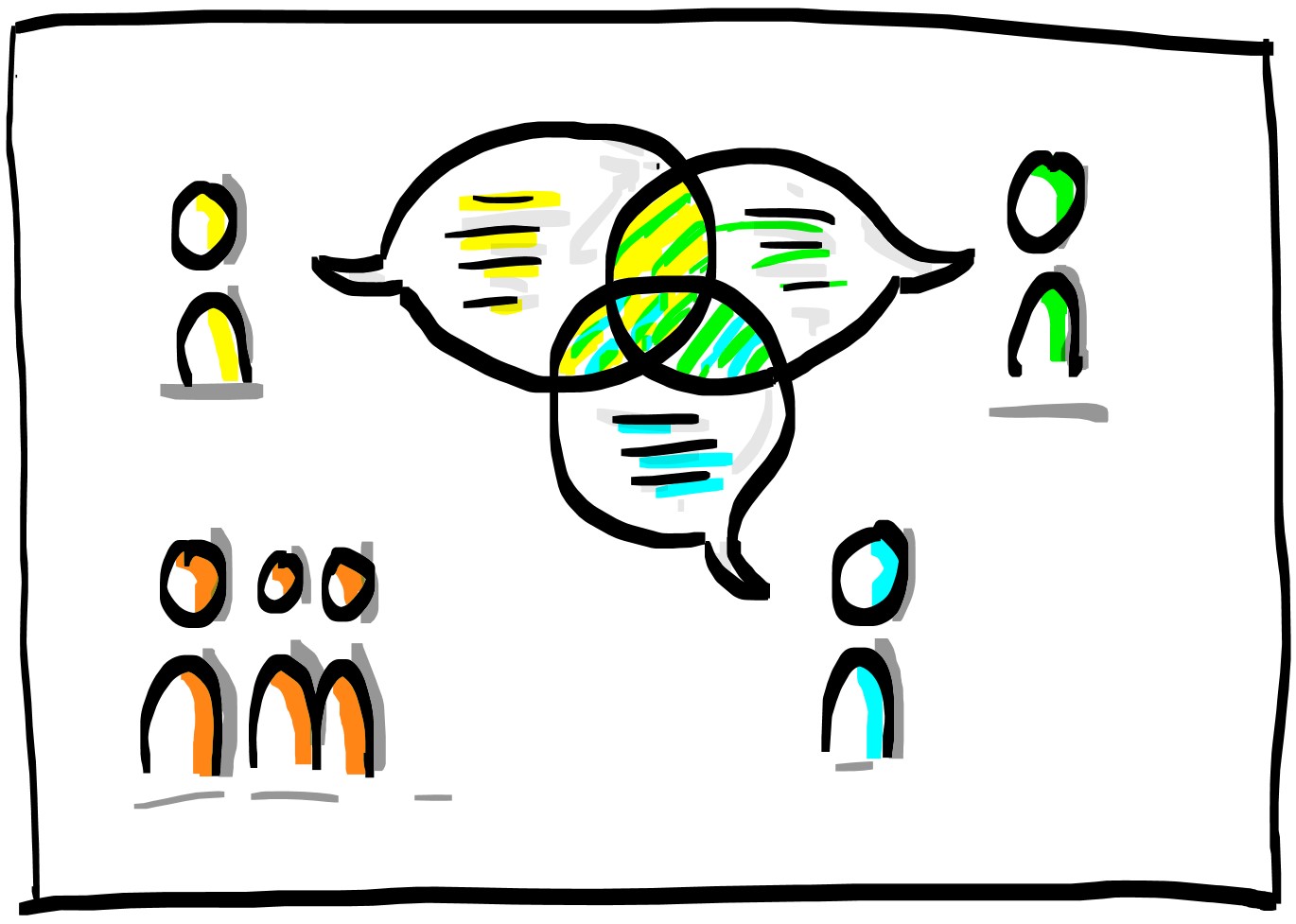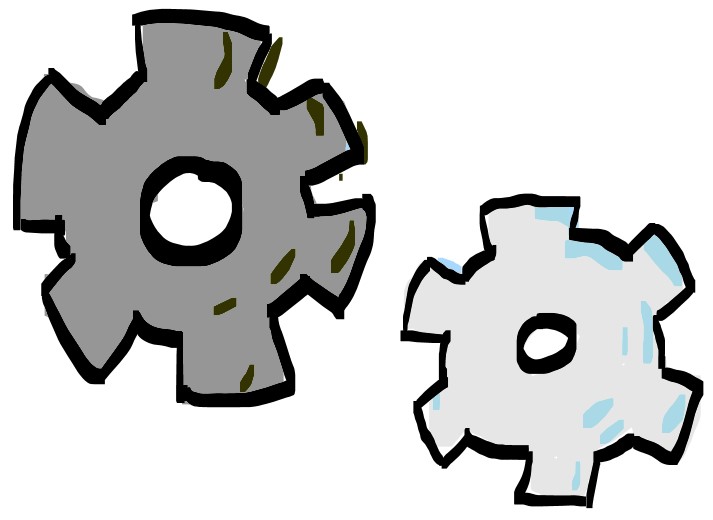There is nothing more practical than a good theory.
In the first part of this small series on systems theory, we asked how a system becomes a system. Simplified: A system is a unit that contains several elements. The elements of a system are connected to each other. Sometimes more, sometimes less. So, today, let’s turn our focus on the question:
How Do Systems Work – In General?
Structure: The parts of a system are always connected and/or in a relationship with each other. And be it only the common “shell” or “outer skin” that unites them. The network of connections and relationships are the structure of a system.
“Material“: Connections and relationships are shaped solely by communications. (I know, that’s a tough one, but bear with me.)

Organization: Systems continuously organize their own structure. And they do so from within themselves. Systems create (survival) important elements and connections and at the same time ensure that existing parts stay alive. Threats are turned off and/or repelled.
Living/developing/existing: Systems ensure that at least they continue to exist or survive and – possibly – develop further (e.g. grow).
Self-preservation is the primary (only) task: It is often said that systems tend to preserve themselves. This is not entirely true. And it is misleading. For one might think that systems also do other things. However, strictly speaking, systems do nothing else. If they fail to do so, systems die or cease to exist.
Exchange with environment: As they try to maintain themselves, (the vast majority of) systems also depend on exchange with their environment. This means that systems also help other systems to maintain themselves. But this is – IMPORTANT! – only a side effect. The better systems adapt to the environment and interact with it, the greater the chance of success and survival.
Behavior: How systems behave depends on how the cause-and-effect relationships are set up internally, i.e. how structures and dependency relationships are organized.
Types: There are simple, complicated, and complex systems (and any number of hybrid forms), each of which behaves differently (also situationally):
- Simple Systems: Always follow consistent, (relatively) easily recognizable cause-and-effect relationships. “If I do X, Y is sure to happen”; “Input X results in output Y.” Examples: Toilet flush, Swiss army knife.
- Complicated systems: Always follow the same cause and effect patterns. However, they are not immediately obvious. If you put some effort into it, it’s possible to explore those patterns. Example: Boing 747.
- Complex Systems: Follow neither obvious nor equal and/or certain causalities (“If I do X, Y may happen. At least, that’s how it was last time. However, things have changed since then. I can’t say with certainty.”) Example: people, conversations, thoughts.

Short Explanatory Note
To the real-life practitioners who are already restless: Please be patient. We’re looking at this THEORETICALLY, MODELALLY and VERY SIMPLIFIED (ultra abbreviated at that).
Please remember: It is also called SystemTHEORY. Not SystemPRAXIS. Theories serve to find a good way of coping with everyday phenomena. And clearly: The map is not the territory!
So, having sorted that out, a few more
Examples of Complex Systems
Corporation
- Structure: The corporate group is where the subsidiaries come together
- Material: The concern consists of everything that is spoken and written and how it is spoken and written. Both internally and externally. With all the media that is available: Meetings, telephone calls, video conferences, emails, internal briefings as well as advertising messages, etc.
- Organization: If an area is missing, it is either established or acquired. If there is a ( presumable) need, it will be worked on until the budget is allocated for it.
- Further development: If a division gets into difficulties and thus endangers the group result, rescue or restructuring measures are first taken. If a division/company is no longer profitable, it is closed down or sold.
- Self-preservation: Ever worked for a corporate group? Ever asked what the point is of you reporting the less than meaningful numbers there every week? Now you know. To secure the jobs of all the corporate controllers. It makes sense for the colleagues! Wink wink.
- Exchange with the environment: Financial injection from private investors or from the state. Trade agreements with suppliers, cooperation agreements, etc.
Human
- Structure: Body, organs, bone structure, bodily fluids, etc.
- Material: Nerves, neurotransmitters, biochemical processes, emotions of all kinds, etc.
- Organization: Conscious or unconscious regulation of breathing, muscle tension, etc.
- Organization. Energy is directed to where it is most needed. Etc.
- Evolvement: Permanent regeneration of all cells
Colleague Dispute
- Structure: Conflicting ideas, thoughts, thought structures. AND, to make it even more complex: The personalities of the colleagues who are arguing with each other
- Material: Everything that is said and done (and what is not) in terms of language and body language, as well as how.
- Organization: The dispute is kept simmering as long as there is a basis for it. Meaning: as long as at least one participant in the dispute still sees a reason for it.
- Further Development: Ideally, a dispute will grow into a productive idea, a new form of cooperation, or simply a stronger relationship between the conflicting parties. If things wrong…
- Exchange with the environment: Classic: The disputants look for confirmation in their camp (well-meaning colleagues, professional arguments from external experts). Or also: help from mediators.
 A Few Questions for You to Help You Digest
A Few Questions for You to Help You Digest
- Does all this make sense to me? Do I understand it? Why? Why not?
- What examples can I think of from my world of simple, complicated, and complex systems?
- What structures do I recognize there?
- How can all this help me in my work?
What Else Comes to My Mind?
- Ameln, Falko von: Konstruktivismus. Die Grundlagen systemischer Therapie, Beratung und Bildungsarbeit.
- Appelo, Jurgen: How to Change the World. Change Management 3.0.
- Snowden, Dave: Cynefin – Weaving Sense-Making Into the Fabric of Our World.
- Simon, Fritz: Einführung in Systemtheorie und Konstruktivismus.
- Taleb, Nassim Nicholas: Antifragile: Things that Gain from Disorder.
 A Few Questions for You to Help You Digest
A Few Questions for You to Help You Digest